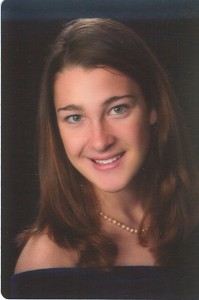Baltimore teen wins Alzheimer’s Foundation of America scholarship award
Grace Kearney, 18, was unsure what career to pursue after graduating from Baltimore Polytechnic Institute. After spending three years working with Alzheimer’s patients as a research assistant at Johns Hopkins Hospital, she found her passion – gerontology.
A high school student at the time, Kearney grew up listening to stories about her father’s patients. As an end-of-life care physician, he treated problems that all elderly people face. This was Kearney’s first introduction to the world of degenerative diseases.
Her stint at Johns Hopkins began as part of a research course. There she met Peter V. Rabins, M.D., MPH, co-director of the division of geriatric psychiatry and neuropsychiatry at the Johns Hopkins School of Medicine. An expert on Alzheimer’s disease, Rabins served as Kearney’s mentor.
“We had to cultivate our own research project with research questions,” Kearney said. “Dr. Rabins wanted to add patients to the experience. He let me be his shadow as I followed him on his rounds.”
“She was able to see beyond [patients’] impairments and link with the person inside the illness,” Rabins said. “What was particularly instructive was that she was able to balance a recognition of the person’s limitations and needs with an appreciation of the struggles of their family care providers.”
Kearney spent about seven hours a week at the clinic, learning about the patients as individuals and the disease, which affects 5.1 million Americans.
“I was always interested in the causes behind the diseases,” Kearney said. “My father would talk about the people and their personalities. I wanted to get to know the patients as people.”
Inspired by the work of her father, Dr. Rabins, and the medical team at Johns Hopkins, Kearney decided she wanted to study the aging process.
“I never really considered a career in medicine before this,” she said. “At the clinics I would talk to the people but I couldn’t treat them.”
Kearney’s research at the clinic allowed her to develop an understanding of the disease and how it shapes a patient’s mind. She showcased this knowledge in an essay she submitted for the Teens for Alzheimer’s Awareness College Scholarship competition, held by the Alzheimer’s Foundation of America (AFA).

Established in 2008, the scholarship was formed to give teens a creative outlet to express how Alzheimer’s disease has impacted their lives and others in their family and community. It is one of several initiatives of AFA Teens, a division to educate and engage teens in the cause.
About 1,800 applicants submitted essays. Kearney’s, titled “Through the Looking Glass: Understanding the World of the Alzheimer’s Patient,” won the $5,000 grand prize. She drew on comparisons from Lewis Carroll’s book, “Through the Looking Glass and What Alice Found There” to explain how individuals can be trapped in time or by their own minds.
“I knew there were a lot of participants,” Kearney said. “I entered on a whim. I thought the prize would go to someone who had a grandparent with Alzheimer’s or someone with a more personal connection to the disease.”
In the essay, Kearny described how her work at Johns Hopkins led her to connect with Alzheimer’s patients.
“Gradually, I come to understand that the world inside each patient’s mind is as legitimate as the world inside mine — that our interior reality is the only one that matters,” she wrote. “My perception of reality, though unaffected by brain disease, is not universal. Acknowledging this, I am better able to accept and welcome the range of perspectives I will encounter in this clinic and beyond.”
Eric J. Hall, AFA’s president and CEO, spoke highly of Kearny and her outlook on Alzheimer’s disease.
“Her experience speaks to the importance of exposing the younger generation to the reality of this disease, since more and more of them will face it in their own families, communities or career paths,” Hall said. “Grace’s health care aspirations are truly inspiring, especially at a time when an alarming shortage in the geriatric health care workforce portends a barrier in the delivery of services to older adults with Alzheimer’s disease and other chronic diseases now and in the future,” he added.
Kearney will be attending Stanford University in the fall to study medicine. She is already mapping out career goals.
“In the conversations that took place in that geriatric clinic each Wednesday, there was one phrase I heard more often than any other,” Kearney said. “When patients were asked for their most fervent desire, I heard again and again ‘I just want to go home.’ This sentence contains what I think should be a doctor’s main objective—to find that place where a patient can feel at home and do everything possible to help them get there. As I pursue a career in medicine, this is how I want to save lives.”

Zach Sparks is an aspiring journalist with interests in a multitude of different areas including news, human interest stories and sports. A student at Towson University, he currently holds an internship at a public relations and advertising firm in Owings Mills where he writes and distributes press releases for several local non-profit organizations among other duties. He hopes to graduate in the fall of 2012 and parlay his experiences and education as a student into a successful writing career.
